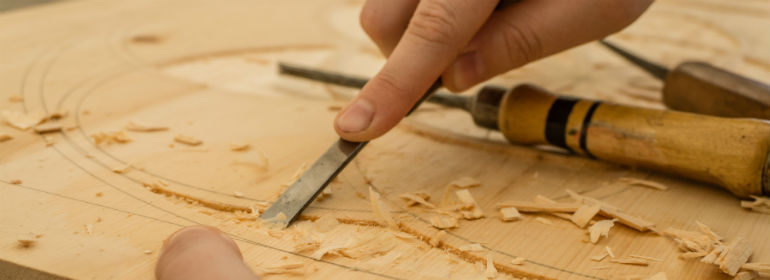Want to work with wood? Find the right path to a woodworking career
Want to work with wood? Find the right path to a woodworking career

Interested in building things with wood? Jon Culshaw explores some of the ways to start a woodworking career.
If you enjoy the woodworking part of design & technology, or even if you just like the idea of the smell of fresh sawdust every day, a job in woodwork can be fun and challenging.
Find a woodwork course, or get paid to learn
There are two main ways to get into woodworking as a career – through a Construction Industry Training Board (CITB) course, or with an apprenticeship.
Your local college should offer a CITB course, which can cover different types of joinery.
Doing an apprenticeship is a great way to learn. You’ll be paid whilst getting experience in a proper workplace, as well as going to college part-time. When the apprenticeship finishes, there’s an opportunity for your employer to take you on full-time, though this is not guaranteed.
It’s worth looking at both options to find one that suits you – but it’s also useful to know about the types of woodwork you could be doing first.
What does a carpenter or joiner do?
This is the most well-known role in the woodworking industry. A carpenter or joiner will work on some of the more obvious woodwork tasks – from working on a building site to making products like doors in a workshop.
A site joiner works on construction sites and helps with any of the woodworking aspects to construction. Laying floorboards, roofing and fitting skirting boards are just a handful of examples.
As well as working on building sites for new buildings, site joiners also work on projects in people’s homes, including everything from converting a loft to hanging a front door.
Being a site joiner means working on a variety of tasks. Over time you might be able to run your own business – however, working outside in typical British weather isn’t for everyone!
A bench joiner can be more of a specialised job. You’ll work at a workbench – hence the name bench joiner – and create items like doors, windows, gates, conservatories. Bench joiners often build things to specific measurements, as well as using machines to sand or plane the timber.
Bench joiners who are good at their job can expect steady work and good pay.
Whether you’re more interested in being a site joiner or bench joiner, the best way into those jobs is through a CITB course, which gives good all-round training. The CITB can also help with putting you in touch with a local joinery company.
What does a wood machinist do?
Woodworking machinists tend to work in workshops large and small, using machines to make wood products or simply working in a timber mill producing wood to be sold at timber merchants.
There are different types of machine, from planers to CNC (Computer Numerical Control) machines, which cut the wood using measurements in a computer drawing.
It’s a steady job to have, but doesn’t have the variety of work that comes with being a joiner or cabinet maker.
To become a wood machinist, look for an apprenticeship with your local college. Wood machinist apprenticeships aren’t as widely available as joinery apprenticeships, so you may have to look a little bit harder to find one.
What does a furniture or cabinet maker do?
Furniture makers and cabinet makers are usually good at design. If you have an eye for detail and can come up with your own designs, this might be the job for you.
Cabinet makers create everything from fitted cupboards through to staircases and doors. Because most of the furniture people buy is mass-produced, cabinet makers tend to build custom-made products or work on restoring older woodwork items and furniture.
The best way into this role is through an apprenticeship with a local company, or by looking for a specialist training course.
Not sure which path to take?
If you feel that a career in woodwork is appealing but you’re not sure which type of woodwork would suit you, doing a CITB course in carpentry or joinery will give you experience of lots of different woodwork tasks. You might not enjoy them all, but there should be some that bring you satisfaction. Good luck!
Jon Culshaw is a ‘timber ninja’ for Gate Expectations by Inwood, specialising in wooden gates and garage doors. Jon comes from a family of joiners going back through three generations of time-served craftsman. He loves the smell of sawdust in the morning!
Find out more
Watch videos on careers in woodwork:





